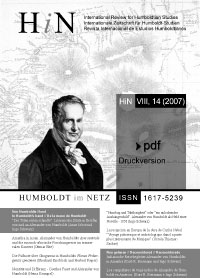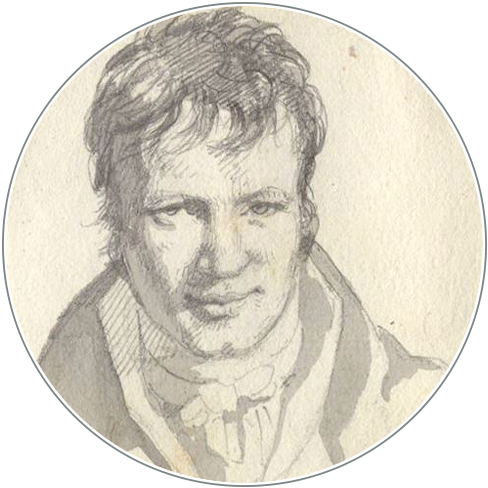Identität und Differenz. Goethes Faust und Alexander von Humboldt
DOI:
https://doi.org/10.18443/91Palabras clave:
Faust, Johann Wolfgang GoetheResumen
Resumen
El artículo „Identidad y diferencia entre el Fausto de Johann Wolfgang von Goethe y Alexander de Humboldt“ intenta responder a la pregunta, cuánta personalidad de Faust se encuentra en Alexander de Humboldt y cómo se puede relacionar el Fausto de Goethe con Alexander de Humboldt. En el centro se encuentran las reflexiones sobre la relación de actividad, comprención y visión así como la relación entre lo humano y la naturaleza. Humboldt y Goethe eran personajes de la Ilustración. Hoy día sus ideas y visiones nos advierten expresamente que la época moderna es un proyecto incompleto. El Fausto de Goethe se enfoca hacia el ente humano porque en cada humano surte efecto el principio de Fausto y de Mephisto. Estos principios repercutieron en Humboldt entre otras como una fuerza motriz de creación más alta y un aumento de cognición. Faust no perdió la apuesta, pero tampoco la ganó. Sin embargo, Humboldt la habría ganado. En vista de las crisis ecológicas globales y conflictos regionales la temática del Fausto de Goethe y Alexander de Humboldt son de sorprendente actualidad.
Zusammenfassung
In dem Beitrag „Identität und Differenz - Goethes Faust und Alexander von Humboldt“ wird der Frage nachgegangen, wie viel Faust in Humboldt enthalten und in welcher Weise Goethes Faust zu Alexander von Humboldt in Beziehung zu setzen ist. Hierbei steht der Zusammenhang von Tätigkeit, Erkenntnis und Vision, sowie das Verhältnis zwischen Mensch und Natur im Mittelpunkt der Betrachtung. Goethe und Humboldt waren Persönlichkeiten der Aufklärung. Ihre Ideen und Visionen weisen uns heute darauf hin, dass die Moderne ein unvollständiges Projekt ist. In Goethes Faust wird die Frage nach dem Wesen des Menschen gestellt, denn in jedem Menschen wirkt das faustische und mephistophelische Prinzip. Bei Humboldt wirkten diese Prinzipien u.a. als Triebkraft größeren Schaffens und höherer Erkenntnisgewinnung. Wenn auch Faust in der Wette mit Mephisto nicht gescheitert ist, so ist er aber auch nicht der Gewinner. Humboldt hätte die Wette jedoch gewonnen. In Anbetracht globaler ökologischer Krisen und regionaler Konflikte besitzt die Thematik von Goethes Faust und Alexander von Humboldt eine erstaunliche Aktualität.
Abstract
In the article “Identity and difference between Goethe`s Faust and Alexander von Humboldt” the issue of how much Faust is contained in Humboldt and in which way Goethe`s Faust has to be related to Alexander von Humboldt is discussed. Here the connection of activity, knowledge and vision as well as the relationship between humans and nature are central to the examination. Goethe and Humboldt were greatly influenced by the enlightenment. Their ideas and visions show us today that modernity is an incomplete project. In Goethe`s Faust the question of the essence of mankind is posed because there is a hint of Faust and Mephisto in each human. With Humboldt those principles acted among other things as a driving force for greater productitivity and the extraction of knowledge. Even though Faust did not fail in his bet with Mephisto, on the other hand he also did not win. Humboldt, however, would have won the bet. Considering the global ecological crisis and regional conflicts today the idea of the relation of Goethe´s Faust and Humboldt has an astonishing relevance.
Descargas
Publicado
Cómo citar
Número
Sección
Licencia
Derechos de autor 2007 Heinz Krumpel

Esta obra está bajo una licencia internacional Creative Commons Atribución-NoComercial 4.0.
Los derechos de los artículos enviados permanecen en manos de los/as autores/as y se publican bajo una licencia CC (CC BY-NC 4.0). Todos los/as autores/as que publican en HiN aceptan este modelo de licencias.
Es responsabilidad de los/as autores/as obtener la autorización necesaria para la publicación de imágenes.
Los derechos del Diseño de Impresión y el diseño de la revista no son transferibles y no pueden reutilizarse de ningún modo para otras publicaciones sin previa aprobación de HiN.









